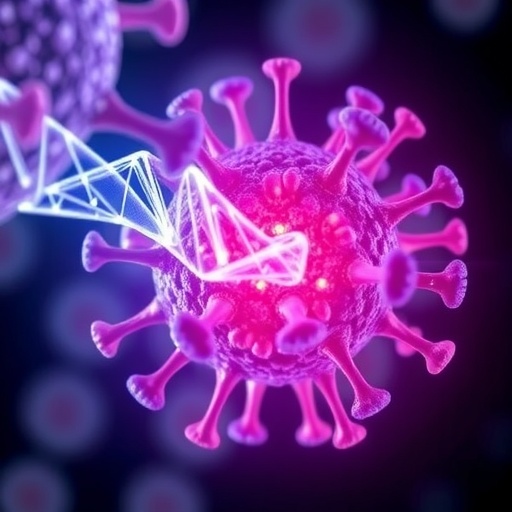In recent years, the field of cancer immunotherapy has gained immense traction, representing a groundbreaking shift in how we approach the treatment of malignancies. Researchers are increasingly turning to dendritic cells as a pivotal component in harnessing the power of the immune system to combat cancer. A recent study published by Prakash, Cortez, and Jayaraman in the Journal of Biomedical Science highlights innovative gene engineering strategies and drug delivery systems aimed at enhancing the efficacy of dendritic cells in immunotherapy. This research opens new avenues for improving patient outcomes in cancer treatment.
Dendritic cells serve a critical role as sentinels of the immune system. They are responsible for processing and presenting antigens to T cells, thus initiating robust immune responses. However, the potential of dendritic cells in cancer therapy has been largely underutilized due to several inherent challenges. One of the main limitations has been the inefficient delivery of therapeutic agents to these cells. The innovative methods outlined in the new study seek to address this issue by improving gene delivery systems specific to dendritic cells.
Prakash and colleagues detail an innovative approach to modify dendritic cells genetically, enhancing their ability to elicit anti-tumor immunity. The authors describe how engineered dendritic cells can be employed to express cancer-associated antigens, which would effectively train the immune system to recognize and eliminate tumor cells. This targeted method could potentially lead to a more durable and effective immune response compared to traditional treatments, which often lack specificity.
The study further elaborates on the integration of viral vectors as a means of delivering genetic material into dendritic cells. The use of viral vectors, which are modified to be non-pathogenic, allows for the introduction of therapeutic genes with higher efficiency than conventional methods. This incorporation not only enhances the effectiveness of dendritic cell-based therapies but also provides a platform for a personalized approach to immunotherapy, tailoring treatments to the unique antigenic profile of individual tumors.
Another groundbreaking aspect of this research involves the advancement of nanotechnology in drug delivery systems. The authors explore how nanocarriers can be utilized to transport drugs and genetic materials directly to dendritic cells. By encapsulating chemotherapeutic agents or immune modulators within nanoparticles, they can achieve sustained release and controlled timing, allowing for a more strategic attack on cancer cells. This controlled delivery mechanism minimizes off-target effects and maximizes therapeutic efficacy, presenting a significant advantage over traditional rapid-release methods.
Moreover, the authors present compelling preclinical data supporting the application of these novel systems. Their results indicate a remarkable uptick in the activation of T cells when dendritic cells were treated with these engineered systems, showcasing improved tumor regression in various cancer models. Such findings affirm the clinical relevance of combining gene engineering with innovative drug delivery, positioning them as foundational elements in the development of next-generation cancer therapies.
Challenges do remain, however. One of the significant hurdles identified in the study involves the risk of immune tolerance, where the immune system may inadvertently ignore tumor antigens due to repeated exposure. Hence, the researchers emphasize the need for ongoing studies aimed at optimizing dosing regimens and timing of antigen exposure. Providing the immune system with a balanced activation signal is crucial for avoiding tolerance and ensuring sustained responses.
The implications of these findings extend beyond cancer treatment alone; they also offer insights into treating other diseases where the immune system plays a critical role, such as autoimmune disorders and infectious diseases. The potential for cross-disciplinary applications only serves to illustrate the revolutionary impact of the research conducted by Prakash and colleagues.
As cancer continues to pose one of the most significant public health threats of our time, studies like this are imperative in our quest to unlock the full potential of the immune system. Researchers are hopeful that with these innovative engineering approaches, the future of cancer therapy will see a shift toward more personalized, effective treatment modalities that not only manage disease but aim for a cure.
As this field of research evolves, collaborative efforts between immunologists, molecular biologists, and medical professionals will be instrumental in translating these findings into clinical practice. The ongoing investment in understanding and manipulating the immune response will continue to be a driving force in creating novel therapies that hold the promise of transforming patient care.
In conclusion, the research conducted by Prakash et al. represents a significant leap forward in cancer immunotherapy, laying the groundwork for a future where gene engineering and advanced drug delivery systems become staples in clinical practice. With continued research and innovation, the fight against cancer may soon evolve into a more tailored and effective battle equipped with cutting-edge technology aimed at empowering patients with stronger, more educated immune responses.
The potential impact of such innovations cannot be overstated. The evolution of immunotherapy, driven by advances in gene engineering and drug delivery systems for dendritic cells, suggests a paradigm shift in how we understand and treat cancer. As we look to the future, the implications for patient survival and quality of life are promising, with the possibility of more targeted, effective treatments just on the horizon.
Subject of Research: Gene engineering and drug delivery systems for dendritic cells in cancer immunotherapy.
Article Title: Innovative gene engineering and drug delivery systems for dendritic cells in cancer immunotherapy.
Article References:
Prakash, M., Cortez, C.D., Jayaraman, A. et al. Innovative gene engineering and drug delivery systems for dendritic cells in cancer immunotherapy. J Biomed Sci 32, 95 (2025). https://doi.org/10.1186/s12929-025-01191-1
Image Credits: AI Generated
DOI: https://doi.org/10.1186/s12929-025-01191-1
Keywords: cancer immunotherapy, dendritic cells, gene engineering, drug delivery systems, viral vectors, nanotechnology, personalized medicine, immune system, therapeutic agents, tumor regression, immune tolerance, immunological approaches, cancer treatment, innovative therapies.
Tags: antigen processing and presentationbreakthroughs in cancer researchcancer immunotherapy advancementschallenges in dendritic cell deliverydendritic cell therapy innovationsdrug delivery systems for immunotherapyengineered dendritic cells for cancerenhancing immune response in cancergene editing in cancer treatmentimmune system modulation in oncologynovel strategies in cancer immunologypatient outcomes in cancer therapy





